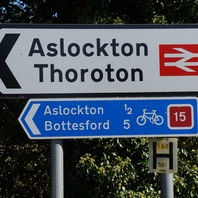
Viking Names
Thoroton
Thoroton, in the Bingham Wapentake of Nottinghamshire, comes from the Old Norse male personal name Þurferð and the Old English element tun ‘farm, settlement’. It is thus a hybrid name, like others nearby, such as Aslockton and Colston Bassett. The Thoroton Society, Nottinghamshire’s principal historical and archaeological society, takes its name from Dr Robert Thoroton who, in 1677, published the first history of the county. He in turn (or rather one of his ancestors) presumably took his name from the village.
Read More
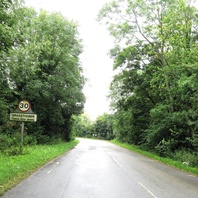
Viking Names
Grassthorpe
Grassthorpe in the Thurgarton Wapentake of Nottinghamshire is an Old Norse compound from gres ‘grass’ (which could also be Old English) and þorp ‘a secondary settlement, a dependent outlying farmstead or hamlet’.
Read More
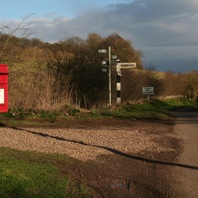
Viking Names
Skendleby
Skendleby, in the South Riding of Lindsey of Lincolnshire, is a name of uncertain origin. The first element is obscure, but is perhaps scenehelde ‘beautiful slope’ from Old English scene ‘bright, beautiful’ and helde ‘slope’. The second element of the place-name is Old Norse by ‘a farmstead, a village’.
Read More
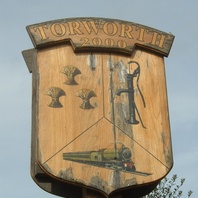
Viking Names
Torworth
Torworth, in the Bassetlaw Wapentake of Nottinghamshire, comes from the Old Norse male personal name Þórðr and the Old English element worð ‘enclosure’.
Read More
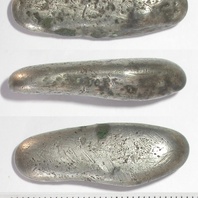
Viking Objects
Silver Ingot (DENO-CE6103)
This silver ingot was made by melting down worked silver and casting it in an open mould. The Vikings arriving in England had a bullion economy in which they paid for goods with silver that was weighed to an amount agreed between the buyer and the seller. Hacksilver and silver ingots are the most common evidence for their bullion economy. It took some time for the Scandinavian settlers to adopt a monetary economy like that of the Anglo-Saxons, and both systems were used simultaneously for a while before they fully adopted the new system. The Vikings were familiar with monetary economies but they treated coins as just another form of silver before adoption of a monetary economy.
Read More
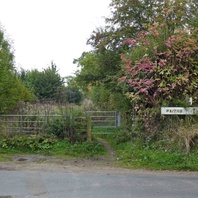
Viking Names
Waithe
Waithe, in the Haverstoe Wapentake of Lincolnshire, is thought to be originally derived from Old English (ge)wæd ‘a ford’. By the later twelfth century, the -d- was replaced by -th- either because of the Scandinavianization of the pronunciation, or by the replacement of (ge)wæd with its Old Norse cognate vað ‘a ford’. In both cases the meaning of the name is ‘at the ford’, which must be over Waithe Beck, where a minor road crosses the stream half a mile east of the church.
Read More
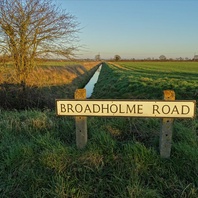
Viking Names
Broadholme
Broadholme, in the West Lindsey district of Lincolnshire, comes from the Old Norse male personal name Broddi and the Old Norse element holmr ‘an island, an inland promontory, raised ground in marsh, a river-meadow’. Hence, ‘Broddi’s island’. Historically, the parish belonged to Newark Wapentake, Nottinghamshire, but was transferred to West Lindsey in 1986 by the Local Government Boundary Commission.
Read More
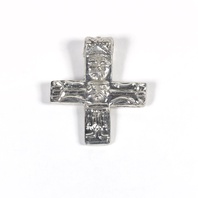
Viking Objects
Reproduction Crucifix Pendant
Crucifixes like this one would have been worn to display one’s faith and may have been a way for newly converted Scandinavians to be more accepted in society. By the late tenth to early eleventh centuries, assimilation would have seen many Scandinavians, both elites and common people, converted to Christianity and adopting Anglo-Saxon ways.
Read More

Viking Names
Sookholme
Sookholme, in the Bassetlaw Wapentake of Nottinghamshire, lies in a river valley and the etymology of the name reflects its location. The first element is Old English sulh ‘a plough; a ploughland (i.e. the amount of land which can be cultivated with one plough)’ which is combined with the second element, Old Norse holmr ‘an island, an inland promontory, raised ground in marsh, a river-meadow’. Thus it is a hybrid name with the probable meaning of ‘gully island’.
Read More
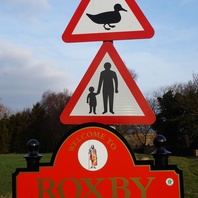
Viking Names
Roxby
Roxby, in the West Riding of Lindsey in Lincolnshire, comes from the Old Norse male name Hrókr and the Old Norse element by ‘farmstead, a village’. Roxby is a joint parish with Risby.
Read More

Viking Names
Kirkby Green
Kirkby Green, in the Langoe Wapentake of Lincolnshire, comes from the Old Norse appellative compound kirkju-by ‘a village with a church’. The affix Green come from Old English grene ‘grassy spot, a village green’
